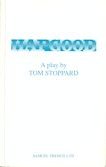Hapgood runs a British counter-espionage agency in Mayfair and someone is leaking information to Moscow. Hapgood suspects Ridley, CIA agent Wates suspects Hapgood and head of British Intelligence, Blair suspects Russian physicist and double agent Joseph Kemer. Code-named Mother to her agents, Hapgood is also the mother of an eleven-year-old son at prep school, the result of an affair with her British “joe”, Kemer. It will need all of Hapgood's famed chess-expertise to reveal the mole in their midst.

